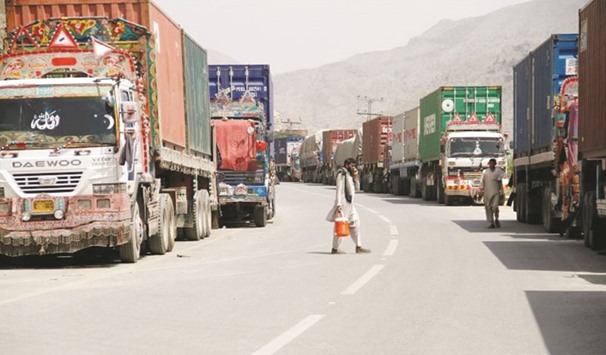The Customs authorities at the Torkham border crossing have also informed the Model Collectorate Customs (MCC), Peshawar, of the situation.
They informed the authorities that the stuck-up containers and commercial vehicles have become a huge issue confronting the bilateral trade and working of the border authorities.
The Collector MCC Peshawar, Qurban Ali Khan, said that they raised the matter with the relevant forum to resolve the issue as it was affecting the bilateral trade and local traders.
Pakistan sealed its border with Afghanistan for an ‘indefinite period’ owing to security concerns following the deadly suicide bombing at Lal Shahbaz Qalandar shrine in Sindh on February 16.
The border remained closed for all sorts of trade, transport and people crossing over to both sides.
However, on March 21 the border was temporarily reopened at Torkham and Chaman crossings to allow Afghan nationals stranded in Pakistan to return to their country and some perishable items stranded at these crossings.
The border crossing at the Torkham, though, has been reopened, yet the issue of cargo containers stuck up in Afghanistan could not be resolved, which has markedly led to further decline in bilateral trade between the two neighbours.
According to the Customs authorities, more than 5,000 empty vehicles stranded across the border due to the monopolised and restricted flow of empty commercial vehicles on the part of the Afghan Transport Union.
Similarly, over 3000 commercial vehicles loaded with the import consignment of mineral coal, soapstone, etc are reportedly stranded across the border awaiting their turn.
The Customs authorities at the border said that this led to an artificial shortage of commercial vehicles, due to which transport charges have shot up ranging between Rs150, 000 to Rs600, 000 per trip to different Afghan cities.
In the wake of this unprecedented increase in transportation charges, the exporters of wheat flour and sugar have started overloading the consignments up to 80 metric tonnes (MT) as the export period of both the items is going to expire on May 15 and 31, respectively.
The export of cement has also witnessed a significant decrease own to the high transportation charges resulting in the price-hike of the Pakistan-origin cement in Afghan markets.
It is adversely affecting the demand and supply of Pakistani cement as compared to Iranian and Central Asian origin cement, which cost lower than that of Pakistani origin cement in the Afghan markets.
The Customs division in Khyber, Torkham, office on May 9, through a letter No 3325, has also informed the MCC that stalemate over the containers and commercial vehicles issue continued.
It said that the stalemate over the unrestricted flow of commercial vehicles from Afghanistan to Pakistan continues since March 21 when the border was opened after 32 days closure.
The matter was taken up with the Frontier Corps (FC) authorities manning Pak-Afghan border at Torkham, and later a two-hour extension in the gate closure was given.
The office of the deputy collector at Torkham division said that the border authorities also sought to take the Afghan Customs into confidence to ensure speedy flow of the empty commercial vehicles to Pakistan.
It informed that the Afghan Customs had also assured all possible cooperation in unhindered flow of commercial vehicles.
The FC also assured of the follow-up on the matter to resolve the issue ie the stuck up vehicles and containers confronted by the traders and transporter of both countries.

